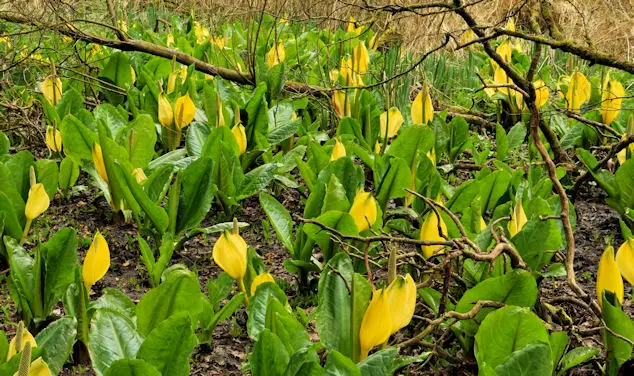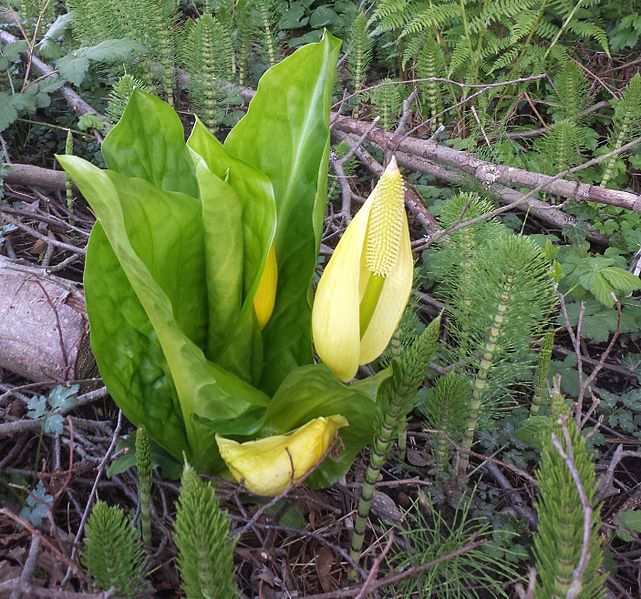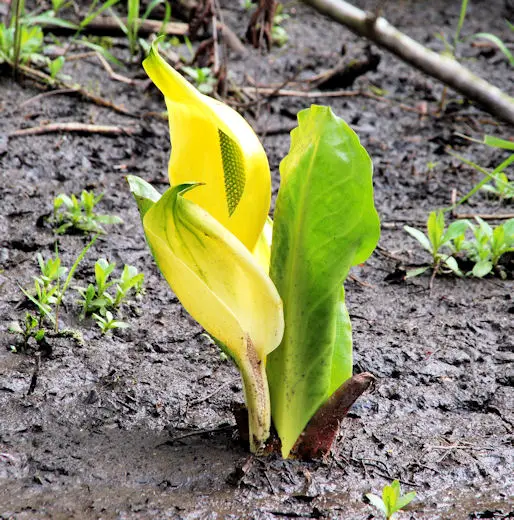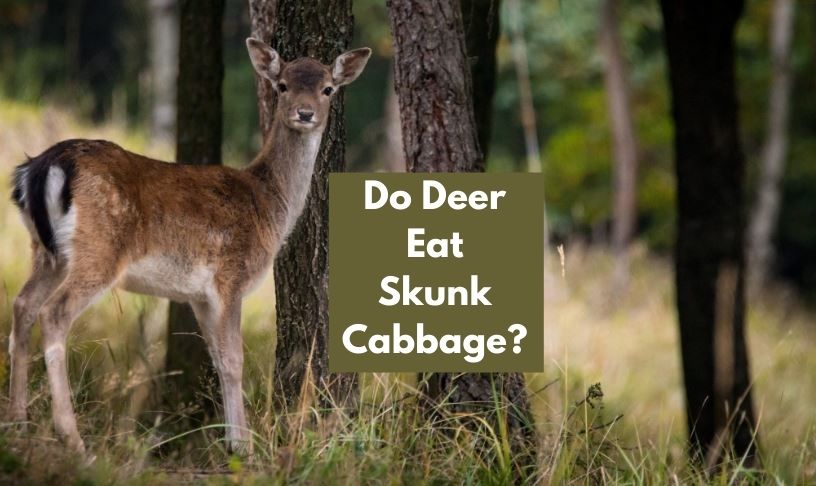There are a lot of myths out there about what deer do and do not eat, especially when it comes to poisonous flowers and plants. One common question is: do deer eat skunk cabbage?
The answer is yes – deer will eat leaves and flowers off of skunk cabbage in the spring and the leaves throughout the summer. Although skunk cabbage contain toxic compounds, the deer eat only enough to where it won’t kill them.
Considering that a single deer can eat up to ten pounds of plants each day, you can see how deer eating skunk cabbage can really do some serious damage to these plants!
Why Do Deer Eat Skunk Cabbage?

As we covered, deer will eat every part of skunk cabbage (stem, leaves, flower and all) when they’ve got the chance after emerging from a long winter where they’re the hungriest.
But why do they do this?
Deer like lush plants that are well-watered and fertilized, and skunk cabbages check every box.
Skunk cabbage is less susceptible to deer damage later in summer when the plant’s center stem is matured.
They’ll stick just to eating skunk cabbage leaves later on in the season.
Deer can do some serious damage to a large amount of skunk cabbage plants in a single sitting if they’re hungry enough!
This was confirmed in a 1999 study on deer plant eating habits by Cornell University.
Plants like skunk cabbage contain water, sugar, protein, and nutrients, which makes them an ideal food source for deer.
And don’t think that newer skunk cabbage plants are safe either: deer actually prefer new growth because they’re more tender.
Additionally, deer will consume a wide variety of foods like skunk cabbage based on opportunity.
They’re planted in the ground, so they’re easy for deer to access.
If you’re not convinced, leave some skunk cabbages out or plant some, and wait to see what happens!
What Is Skunk Cabbage?

Skunk cabbage, aka Symplocarpus foetidus is a low-growing plant that grows typically on moist hill slopes and wetlands.
It gets its name from the unpleasant odor the plant gives off, which increases when the plant is damaged.
Skunk cabbage is one of the first plants to bloom in early spring, making it a prime target for hungry deer that are ravenous for green leaves.
It contains a toxin, oxalic acid, that makes this plant poisonous for humans.
Technically it’s also poisonous to deer, but deer tend to target skunk cabbage when the toxicity levels are lower and only eat the parts with a lower concentration of toxin in them.
Additionally, deer will eat just enough (and mix it with other browse) where it will not kill them.
Is Skunk Cabbage Poisonous?
Skunk cabbage is considered poisonous thanks to oxalic acid, which causes a burning sensation to the tongue and throat when eaten, rendering it inedible for humans.
Deer have tough mouths, so they can handle eating skunk cabbage here and there without too much discomfort.
Deer will eat the leaves and the flower spike in the spring, but will stick to just the leaves once summer comes.
Also, some deer will eat clay or lick minerals from soil that may bind to toxins coming from skunk cabbage so that it counteracts the effects.
Will Skunk Cabbage Grow Back After Deer Eat Them?
Fortunately, skunk cabbages can bounce back from winter browsing by deer if given some care, attention, and time.
They’re pretty hardy and get eaten the most by deer during early spring, so they’ve got plenty of warm weather period to fully regenerate.
Is Skunk Cabbage Good For Deer?

Skunk cabbage contains highly digestible fiber and plenty of protein, so it attracts deer easily.
However, azaleas are typically used for arthritis and injury recovery, and it is believed that these benefits may translate to deer eating azaleas as well.
In addition to being a great source of protein, deer eating skunk cabbage provides them with the following vitamins and minerals:
- Vitamin A
- Vitamin C
- Folate
- Calcium
- Magnesium
- Potassium
- Manganese
These vitamins and minerals provide deer with many benefits.
For example, vitamin C will help protect deer against scurvy and vitamin assists in deer immune system function.
Deer need calcium for bone, teeth, and antler growth and health as well as other bodily functions like milk production and metabolism.
Magnesium helps with antler growth, increasing body weight, and has immune system benefits for deer.
Potassium is great for deer because it helps maintain good pH balance and aid in proper digestion.
Fat-Soluble Vitamins in Skunk Cabbage For Deer
Vitamins A, D, E, K, and calcium are fat-soluble, so they can be stored in the deer’s fat and liver to be used later as needed.
This means that calcium content from deer eating skunk cabbages can be “stored up” for later use, which is highly beneficial.
Water-Soluble Vitamins In Skunk Cabbage For Deer
Vitamin C, B Vitamins, niacin, folic acid, and potassium are all water-soluble, which means they cannot be stored, so they must be replaced continually.
So a deer that eats skunk cabbage for the potassium content must continue to consume foods that contain these necessary vitamins to stay healthy.
Do Deer Eat Skunk Cabbage? Wrapping Things Up
So, do deer eat skunk cabbage?
The answer is yes!
Deer will eat skunk cabbage whenever they can, especially during spring when they’re hungry after a long winter and the buds, stems, and leaves are the most tender.
Have any observations to add to the discussion? Be sure to let us know in the comments below.
Check our our other helpful wildlife guides while you’re here:


